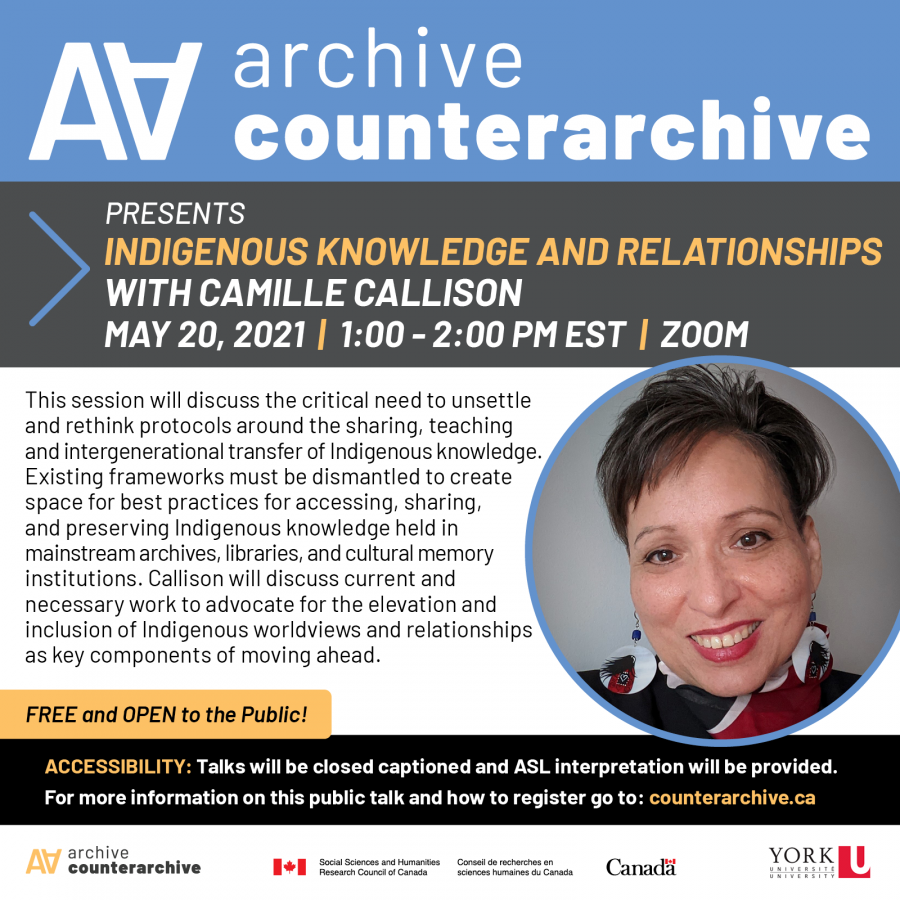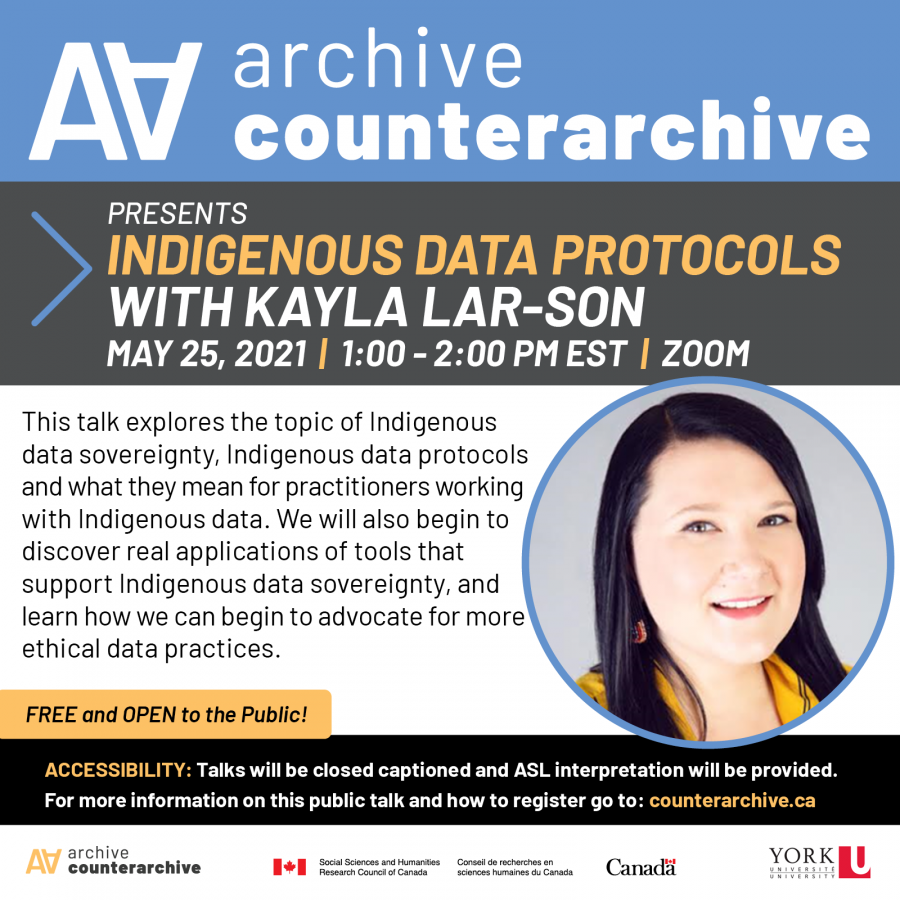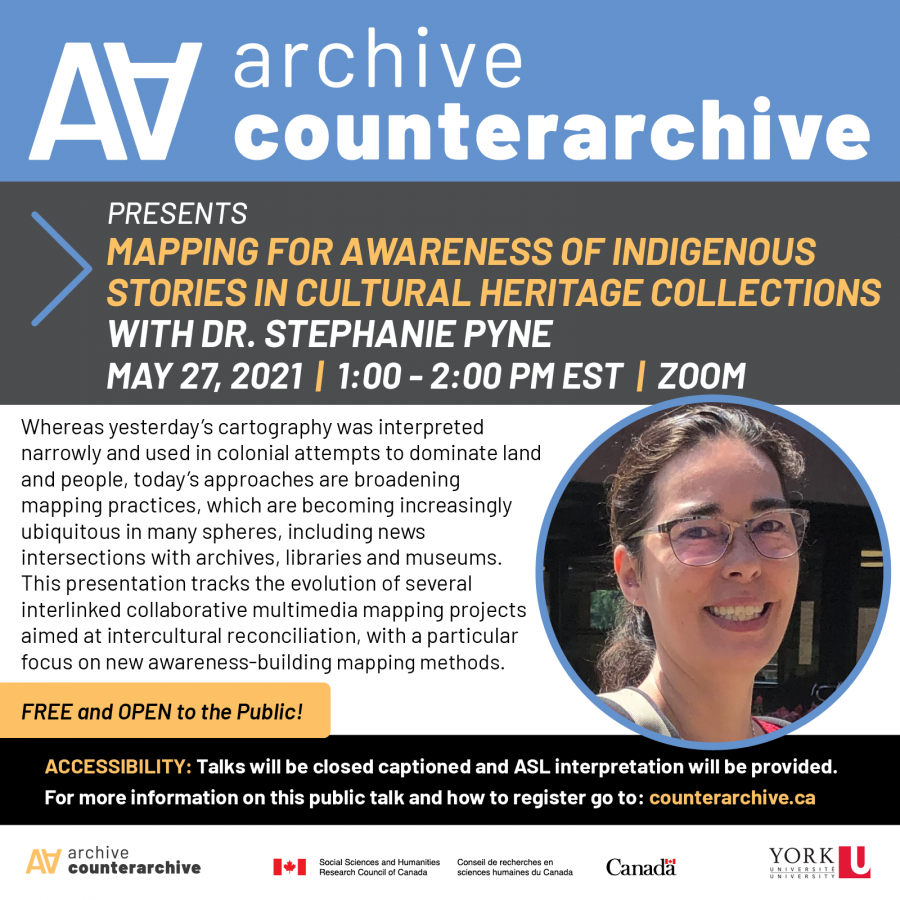Archive/Counter-Archive Summer Institute 2021
Public Talks | The Practice of Indigenous Metadata and Knowledge Organization convened by Dr. Stacy Allison-Cassin
FREE and OPEN to the public!
ACCESSIBILITY: Talks will be closed captioned and ASL interpretation will be provided.
NOTE: An individual registration link is provided for each event. You must register for each event separately.
Thursday May 20, 2021 | 1-2PM EST | Zoom
Indigenous Knowledge and Relationships With Camille Callison
Click HERE to register
This session will discuss the critical need to unsettle and rethink protocols around the sharing, teaching and intergenerational transfer of Indigenous knowledge. Existing frameworks must be dismantled to create space for best practices for accessing, sharing, and preserving Indigenous knowledge held in mainstream archives, libraries, and cultural memory institutions. Callison will discuss current and necessary work to advocate for the elevation and inclusion of Indigenous worldviews and relationship as key components of moving ahead.
Camille Callison (Tahltan Nation) is the Indigenous Strategies Librarian at the University of Manitoba and working on a PhD related to Indigenous knowledges and cultural memory institutions in Anthropology. She is committed to advancing matters related to Indigenous peoples and creating meaningful change related to equity, diversity, and inclusivity within cultural memory professions. Camille serves as the Chair of IFLA Indigenous Matters Section, Secretary of IEEE P2890™ Recommended Practice for Provenance of Indigenous Peoples’ Data, and co-Chair of the University of Manitoba Anthropology Department Repatriation Committee. She is also a member of the National Film Board Indigenous Advisory Group, NISO Diversity, Equity, and Inclusion subcommittee, OCLC Reimagine Descriptive Workflows Advisory Group and the Canada’s Steering Committee on Archives – Truth & Reconciliation Commission Taskforce. Her past service includes terms as Chair of the Indigenous Matters and the Truth & Reconciliation Committees, Canadian Federation of Library Associations (CFLA-FCAB), Vice-Chair of Memory of the World, Canadian Commission to UNESCO (CCUNESCO), President of Manitoba Library Association and UM Indigenous Advisory Circle.
Tuesday May 25, 2021 | 1-2PM EST | Zoom
Indigenous Data Protocols With Kayla Lar-son
REGISTRATION IS NOW CLOSED AS WE HAVE REACHED CAPACITY. ADDITIONAL SPOTS MIGHT BE AVAILABLE ON THE DAY OF THE TALK. PLEASE NOTE THAT THIS TALK WILL BE RECORDED.
Click HERE to register
In this talk we will explore the topic of Indigenous data sovereignty, Indigenous data protocols and what they mean for practitioners working with Indigenous data. We will also begin to discover real applications of tools that support Indigenous data sovereignty, and learn how we can begin to advocate for more ethical data practices.
Kayla Lar-Son is Metis and Ukranian settler ancestry, originally from Treaty Six territory, Tofield, Alberta. She currently resides on the unceded territories of the xʷməθkʷəy̓əm (Musqueam), Sḵwx̱wú7mesh (Squamish), and Sel̓íl̓witulh (Tsleil-Waututh) Nations. At UBC Kayla is the Indigenous Programs and services librarian at the Xwi7xwa Library, and is the program manager librarian for the Indigitization program. Kayla is also a co-host of masinahikan iskwêwak the Book Women Podcast.
Thursday May 27, 2021 | 1-2PM EST | Zoom
Mapping for Awareness of Indigenous Stories in Cultural Heritage Collections With Dr. Stephanie Pyne
Click HERE to register
Whereas yesterday’s cartography was interpreted narrowly and used in colonial attempts to dominate land and people, today’s approaches are broadening mapping practices, which are becoming increasingly ubiquitous in many spheres, including news intersections with archives, libraries and museums. This presentation tracks the evolution of several interlinked collaborative multimedia mapping projects aimed at intercultural reconciliation, with a particular focus on new awareness-building mapping methods that are developing in (i) sketch mapping exercises around the stories of Indigenous residential school survivors from the Where Are the Children website, and (ii) current affairs mapping exercises in the context of a broad range of news stories related to Indigenous issues, including residential schools and reconciliation. Mapping Residential Schools themes first emerged in 2011 during work on the SSHRC-funded cybercartographic Lake Huron Treaty Atlas. Further interest in and use of the map spurred some improvements and led to a further SSHRC grant to develop the cybercartographic Residential Schools Land Memory Atlas in addition to other project outputs. The sketch mapping exercises referred to above provide an interesting example, especially since they provide an opportunity to discuss the most recent iteration, Mapping Survivor Stories, produced with students under the Multimedia Emergent Mapping for Education (MEME) Project.
Dr. Stephanie Pyne completed the requirements for a Collaborative PhD program in Geography with a Specialization in Political Economy in November 2013 and has a longstanding interest in multidisciplinary research. Dr. Pyne’s doctoral research built on her work as a research assistant creating the Treaties Module of the pilot Cybercartographic Atlas for Indigenous Perspectives and Knowledge for the Great Lakes-St. Lawrence Region, and involved the further creation of a cybercartographic atlas intended to shed light on the many dimensions of treaty relationships, including those under the Robinson Huron Treaty. Dr. Pyne's PhD thesis, Sound of the Drum, Energy of the Dance: Making the Lake Huron Treaty Atlas the Anishinaabe Way (2013), comments on many aspects of this evolving work in Cybercartography. After completing a SSHRC post-doctoral research fellowship at the University of Manitoba on April 30, 2016, Dr. Pyne began an ongoing post-doctoral research assignment under the Residential Schools Land Memory Mapping Project (SSHRC Insight Grant, 2015-2020), which builds on her doctoral research and includes working with others in the Residential Schools reconciliation research and education community to expand on work undertaken through my doctoral and post-doctoral studies (see https://gcrc.carleton.ca/index.html?module=module.gcrcatlas_indigenousknowledge). Dr. Pyne continues to blend teaching with collaborative map creation research that intersects with other disciplines and approaches.
These public talks are part of Archive/Counter-Archive's Summer Institute, "Locating Media Archives" (May 18-June 17, 2021). The Institute is comprised of two intensives, taught by Dr. Stacy Allison-Cassin and Dr. Ryan Conrad, that will introduce graduate students to critical issues in activist media and archival methodologies.
As part of this Summer Institute, we will be hosting five public talks (free and open to the public).
More information about the public talks hosted during the second half of the Summer Institute and how to register will be forthcoming.
Questions or technical difficulties? Email Axelle Demus at kmo@counterarchive.ca




